THE PLOT: Dennis Barlow (Robert Morse), a milquetoasty, soaked-to-the-hindears, innocent greenhorn Brit ingénue out of water, comes to LA to seek his fortune, only to have his uncle (John Gielgud) cark it on him. Arranging funeral details at the sinister Whispering Glades cemetery, he falls for make-up mortician Aimee Thanatogenous (Anjanette Comer), but crosses paths with campy nutjob embalmer Mr Joyboy (Rod Steiger) and the sinister mastermind behind the Glades, the Reverend Glenworthy (Jonathan Winters). LA? Sex? Death? Commerce? War? It’s Great Big Over-Ambitious 1960s Film Satire ahoy! And this time… it’s based on a novel by Evelyn Waugh. Think Revelation of the Daleks via Dr Strangelove and you’re nowhere near, but it’s a nice thought to hold all the same.
We open on – well, what’s the most ’60s transatlantic scene you can have? The cabin of a TWA airliner of course, and a lovely old TWA airliner at that, Lovely old airliner at that, complete with neat-hatted stewardess speaking to the passengers on a huge clunky phone. There’s probably an outsize hatbox or two in the overhead compartment as well, but for now we’re concentrating on the gauche form of Robert Morse, a familiar face to fans of mid-’60s light satire like A Guide for the Married Man and How to Succeed in Business Without Really Trying, here cast as would-be Brit poet (with a day job as an artificial insemination operative) Dennis Barlow, whose won his ticket from London to LA in one of those ‘ten millionth customer’ promotions that were everywhere in the sort of fiction that required a cheap and easy plot advancement once upon a time, but which we strongly suspect never took place in reality.
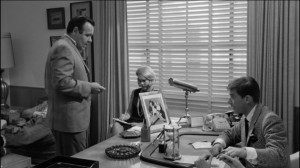 |
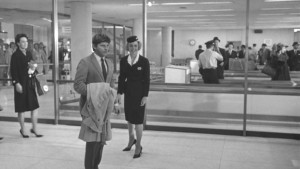 |
LAX airport itself is all stark white surfaces – nothing like those yellow-‘n’-marble expanses in The VIPs – and in fact looks at times like a set from 2001 gone AWOL. But this is a real airport, and the magic’s worked by ace photographer Haskell Wexler, who more than earns his keep throughout the film. In fact, it looks so sumptuous on what can’t have been more than a mid-range Hollywood budget that his lighting is often the one thing that seems to keep this scattershot McFlurry from falling apart completely.
After a contretemps with the unforgiving US passport control, in the shape of James Coburn (‘Beatnik poet, huh? You got one of them Beatle haircuts?’) Morse winds up at the door of his uncle, Sir Francis Hinsley, something of a creative powerhouse in what looks suspiciously like MGM Studios. In textbook white Panama and cravat, Gielgud coaches cowboy hick actor Dusty Acres in English pronunciation. (In a hilarious bit of in-jokery, Dusty is played by actor and famed dialogue coach Robert Easton, ‘the Henry Higgins of Hollywood’. Jokes are, more often than not, ‘in’ in this film. See how many you can spot.) He’s to play a dashing sub-Bond secret agent in a script pitched to producer DJ Jr (Roddy McDowall), a Jim Dale-alike mini-mogul who keeps an Oxygen mask behind his sprawling marble desk for emergencies. Also there is Henry Glenworthy (Jonathan Winters – ooh, a dual role!), pitching for all he’s worth.
The Tinseltown milieu established without too many cringes, Morse and Giely repair to the studio commissary, a riot of psychedelic wall decoration (which becomes the only thing in the picture flattened out by Wexler’s black and white lens) for a Deep Dish Lolita and Breast of Squab Brigitte. American cuisine duly ribbed, they instantly naff off to The English Club, an oak-panelled enclave for British ex-pats in Beverley Hills. On the way, they meet Sir Ambrose Abercrombie, ‘one of our most ardent thespians […] he usually plays prime ministers or butlers’. Sir Ambrose is perfectly incarnated by – oh, did you sneak a peek at the answer? – yes, Robert Morley.
Morley leads the toast to the Queen at the club (staffed by a pratfalling Jamie ‘Klinger’ Farr, no less), and rants on about the importance of putting over a good impression. ‘We have to put uup a good show – I never do anything in my own home that I wouldn’t do in front of camera.’ Indeed, Bob. Morse shacks up with Gielgud at the latter’s facsimile thatched cottage, complete with Olympic-sized swimming pool (drained). Great use is made of the great big phoney heritage architecture that lines this part of California, which we’ve all seen in garish Technicolor with Alan Whicker humming The Flight of the Bumblebee in front of them, but in a proper film and bathed in that stonking black and white glimmer, they’re really otherworldly, which is of course the point, this whole shebang set off as it was by Waugh nipping over the pond and stepping back in amazement at what went on in the Dream Factory.
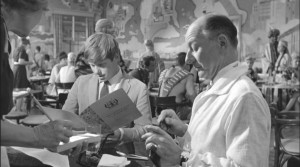 |
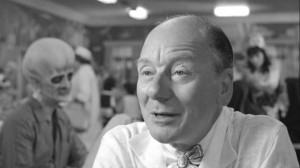 |
In the first of fortunately not too many ‘There’s no way I’m riding that bicycle’ gags, we cut from Morley declaiming ‘there are certain jobs out here an Englishman simply does not take’ to Morse humping dumbells about as a gopher in a gymnasium, turning Morley’s sweatbox up too far for a bit of majorly cartoonish slapstick, in that ever-lovin’ broad ’60s style. An equally sledgehammer running gag has the restaurants, streets and buses of the town populated with movie extras dressed as gladiators, chorus girls and red Indians. Back to Gielgud’s garden, as he shelters under a huge parasol while he paints Dusty, dressed in hunting pinks, astride a stuffed horse, as dialogue coaching continues. ‘It may get a bit dicey if he decides to use the giant squid!’
All’s not well at the studio, however, as McDowall takes hits of oxygen while being massaged with dangerous-looking vibrating electric mittens. Winters is on the phone to ‘his brother’ – ah, here we go! – The Blessed Reverend, who circles the town in a suspiciously silent helicopter. (One jarring aspect of this film is, possibly due to budget or the way Tony Richardson went about things, quite often ambient location noise is weirdly absent.) Something’s got to give on the squid picture, and Gielgud’s the first to get the chop. Taking the news stoically, he walks slowly through the boulevards (that silence is actually quite effective here), and returns
home.
Next morning, he’s hung himself from hsi diving board, and the game’s afoot. ‘Bad form!’ avers Morley, who nevertheless feels he should be given a funeral appropriate to his station – even if Morse has to sell the cottage to pay for it. Cue a lavish tracking shot through the manicured lawns and marble edifices of Whispering Glades, a cemetery based on real life taste-dodging LA stiff house Forest Lawns, but created here out of the less icky environs of Harold Lloyd’s estate, which is all rolling greenery, avenues of neatly trimmed topiary and quietly landscaped vistas. A pair of glasses and a smile bought you a hell of a lot in those days. And here’s Tab Hunter, giving a drowsy party of rubberneckers a guided tour of the place, in particular a twenty-foot statue of Glades fonder, the Rev Winters, in marble and gold, with a built in recording of the man’s deranged cod-Christian visions: ‘sorrow became the mewing of tiny kittens, and the splash of precious duck babies at play…’
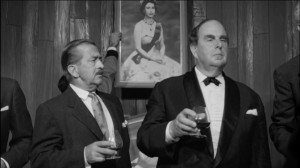 |
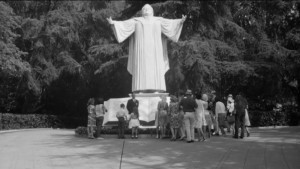 |
Inside, it’s imposing cod-Gothic churchery all the way, with a bevy of lady receptionists in Morticia Addams get up here to help. Morse, after weirdly sneaking a gobble at the breasts of a statue, falls for chief cosmetitican Comer as she lays out the possibilities ofr the mouldering Gielgud in the Gothic Slumber Room : ‘What do you want, inhumement, entombment, inurnment, immurement? Some people just lately have preferred sarcophagusment. It’s very individual.’ Gieuly’s particulars are taken down. ‘Did his face match his figure?’ ‘Hideously.’
It’s been a good four minutes since we had a star cameo, so on rolls Liberace, playing, well, Liberace, or rather the smarmy coffin salesman-cum-counsellor of this establishment. Grinning his Brother George grin, he shows off the coffins to a confused Morse. The Silent Night Special is waterproof, moisture proof and dampness proof. Does he want an eternal flame? Propane or butane? Perpetual eternal or standard eternal? (The standard shuts down at night.) A suit is chosen. The Prince Albert has seams which split open to avoid unpleasantness. Special shoes are needed too. ‘The feet curl a bit, you know, as rig-mo sets in.’
It all gets too much for Morse. (Lots of stuff will get too much for Morse, which is handy, as it enables him to back out of one set piece just as it runs out of steam, and wander round at random for a bit in search of another. It’s the old picaresque tactic that big fat American satirical novels and films rely upon to cram all their disparate ideas into without troubling themselves to write a proper plot or anything, so it is cheating in a strict sense, though if it’s played well it works just dandy, and here it’s played rather well indeed.) Comer takes him on a tour of the place – certified protection against fire, earthquake and nuclear fission – as the old Antiques Roadshow theme plays. The endless avenues of topiary with long, sharp Californian afternoon shadows all look queasily lovely in Wexler’s black and while silveriness, which possibly detracts from the lurid nature of the whole enterprise a bit. Still, we do get the first scene of Morse having his advances rejected – but not entirely of course – by Comer.
Cut to a close-up of Gielgud, and a masterclass in corpse acting from the knight, which honestly isn’t the veiled insult it appears to be. A variety of expressions play across his dead fizzog, as manipulated by the gloved hands of Mr Joyboy, chief mortician with a camp demeanour and a Grade A carpet-chewing, scene-stealing role which Rod Steiger gets stuck into with gay abandon. Floating about the place, camp as owt, all wide eyes and breathy tones, he commands respect from all the other staff, including Comer, who’s come to slap a toupee on Sir John’s withering bonce, and flirt chastely with Mr J, who clearly has a thing for the old dear.
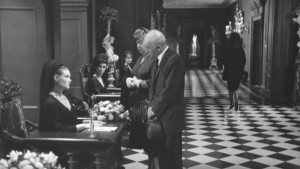 |
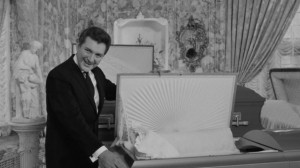 |
Morse and Morley inspect the results. (‘Is he quite… hard?’ ‘I don’t think ive ever seen old Frank looking better!’) and the latter presses the former into writing the old man’s eulogy, in ballad form. Morse rises to the task in fine MacGonagall style. (‘They old me, Francis Hinsley/They told me you were hung/With red protruding eyeballs/And black protruding tongue…’) Reading all this out (plus a few half-inched Shakespeare sonnets) he begins to impress the squeaky Comer, who’s starting to think there might be more to him after all than his Nigel Tufnell/Nick Ross countenance may suggest. On to the funeral itself, conducted in LA style – a marriage ceremony is wound up with TV studio-style warning lights, and a swift, Thunderbirds-style changeover is effected for Gielgud’s ceremony. Standing at an imposing eagle-shaped lectern, Morley starts off reading the ballad, tongue and all, but quickly packs it in and busks the rest, thereby blowing his chances of narrating that Woddis On… audiobook. ‘Taking him all in all…this was a man.’ Morse is summarily kicked out of the ex-pat community and now has to fend for himself. ‘The police have developed new methods of dealing with hooligans like you – dogs and cattle prods!’
Morse gets a new job at a cut-price version of Whispering Glades, the Happier Hunting Grounds Pet Cemetery (‘we take care of all the best: Lassie, Trigger, Mr Ed…’), under the direction of the displaced non-Reverend Winters. Sounds like the cue for a cameo, and here come two: it’s Milton Berle and Margaret Leighton, doing a fantastic old school feuding couple act, he all stern putdowns and belts of Scotch, she all faceslapping and projected sobs. They’re satirising the whole idea of pre-’60s film drama, of course, but you can’t help but warm to their VIPs-style fraughtness, parody or no parody. They’re at war over what to do with their ‘loved one’ – who is, of course a dog.
After she pulls a gun and he wrestles her for it, Morse slopes quietly off to eat his sandwiches in the storeroom, which is naturally filled with passed-over pets. Later he makes another unsuccessful lunge at Comer (‘that’s not an ethical thing to do!’) and, true to high satire’s obsession with moments of low comedy – falls in the water. ‘I can’t swim!’ Comer’s torn up about being courted by this well-meaning British klutz, so she seeks advice from The Guru Brahmin – who turns out to be a soused old newspaper agony uncle played excellently by Lionel ‘Moider!’ Stander. His assistant reads out her anguished missive. ‘He tried to blank blank with me!’ Stander dictated no-nonsense advice in his Louis Armstrong growl. These scenes are great, and far too short.
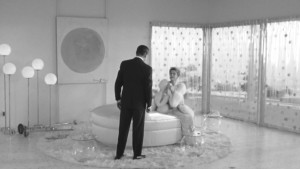 |
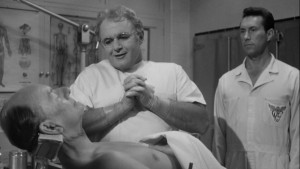 |
Fortunately here comes Steiger again, all breathless handwringing fruity campola, seeking an audience with The Rev in his office, complete with a tray full of duck babies on the desk, for reasons never sought nor given. He lusts after female employees like Ronnie Barker, but there are bigger problems – the Glades is on the financial rocks, and an audacious plan to re-open the cemetery as an old folks’ home is surreptitiously hatched. One minor obstacle – how to get rid of all the corpses currently cluttering up the joint? Tricky. But, avers the Rev, ‘there has to be a way – get those stiffs off my property!’
Plot point two out of the way, it’s time for an infamous set piece. Steiger, now in civvies – a rather fetching candystripe blazer – takes Comer home to meet his bedridden mum, an immense old crone with a pet mynah bird and a food advert obsession. ‘She never misses a King Chicken commercial!’ And makes deranged chomping motions while watching them, virtually orgasming over a Big Boy Crab advert. In the kitchen, Steiger makes dinner, and the campness goes through the roof. ‘Mum’s a heck of a lot of fun, isn’t she? She’s every inch a queen!’ Dinner is an entire suckling pig served up with a cloying ‘Momma’s little Joyboy has piggy, piggy’ refrain, and demolished by the old dear with her bare hands. Never was gross-out comedy so beautifully photographed! This sorry spectacle prompts Comer to send another lovelorn letter to Stander, which receives his full consideration. ‘Tell her to marry the other jerk!’
Morse, meanwhile, visits Comer’s house, which is located – hooray! – in Bronson Canyon, that desolate spot in the Hollywood hills which houses the Batcave, the King of the Rocketmen’s lab, every alien planet the Starship Enterprise ever visited, and countless vulcanised b-movie monsters. Her pad turns out to be a condemned, near-derelict pile built precariously on a ‘slide area’, and filled with random antiques. ‘I surround my self with beauty. I don’t care about what some people call comfort.’ As she swings over a precarious precipice, Morse starts to have second thoughts about this whole deal, and so do we – is it advisable to make your love interest a complete nutter? Kooky, well, yes, that’s fine, even de rigueur at the time, but not dysfunctional, surely? Still, that’s the game being played here – ramp everything up to nutzoid levels. And let’s face it, we’re not dealing with a straight romance here, are we? Barry Norman, perhaps inevitably, writes: ‘Brideshead this ain’t!’
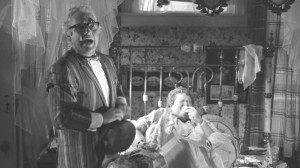 |
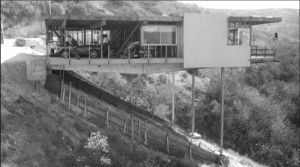 |
Back at the pet cemetery, Winters and Morse are busy burning a dog when a missile crash-lands through the roof. Said projectile is home made, and turns out to be the work of a speccy kid called Gunther, very much in the mould of that propeller-hatted genius chick that silently enraged Foghorn leghorn with his elaborate calculations. Gunther is played by a young Paul Williams, babyfaced proper songwriting genius only a few years away from penning We’ve Only Just Begun, Rainy Days and Mondays and the Love Boat theme. Here, though, he’s press-ganged into launching Steiger’s mum’s dead mynah bird into space, in an experimental new type of pet send-off. Comer, despite jilting the Steig, turns up for the ceremony, which is oddly flash-edited, as Morse intones another winning eulogy (‘Bird, born of egg…’), the rocket buzzes The Reverend’s nearby chopper, and Morse emerges from the launchpad with the requisite low comedy blackface.
Now the fun begins, as Winters the Rev lands and confronts Winters the Dog-burier, and we finally get our two-way special. We blame Alec Guinness for the preponderance of this sort of thing in ’60s cinema, which has to be done incredibly well not to be distracting and annoying. The problem is that, musty old cliché tough it may be, Guinness was a real expert at masking his own persona, so you could forget he was doing his tour de force. At the other extreme – oh, to pluck a name from a hat, Peter Sellers – this sort of business just screams ‘Look! He’s doing two people at once! Fear his acting skills etc.’ in a way that all but drowns out the rest of the film. Hence the bit where the President first chats to Dr Strangelove may tick all the right critical boxes, but gets a bit tiresome. And Soft Beds, Hard Battles is positively knackering to watch, for all the wrong reasons. Here, though, Winters has made a good stab at giving the brothers different voices and mannerisms, a nd the scene’s nicely underplayed, to the actorly pyrotechnics don’t get in the way of the important if rather predictable plot point which sees the two brothers pooling their resources to fire human corpses into space, and save the Rev’s lawns.
But to get hold of the requisite missiles, a bit of buttering up of air force top brass is required, and fortunately the Rev has seen just the man – he’s seen ‘im, he’s seen ‘im! Yep, General Dana Andrews and uniformed chums are invited to a soiree at the Glades, where the chance to romp with some scantily clad lovelies in the display coffins neatly procures funding and makes a clodhopping point about, I dunno, sex and death and war and commerce and stuff, a bit like that Frankie Goes to Hollywood computer game, all to a jangly beach party guitar accompaniment. Andrews, meanwhile, shows he doesn’t have to take his uniform off to have a good time by slugging back the bourbon and pontificating about ‘pink pre-verts’ in a John Wayne accent, thus inviting up another comparison to Strangelove, this one not so favourable. Back at the newspaper, a pissed Stander falls off his chair.
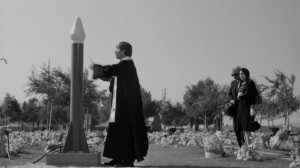 |
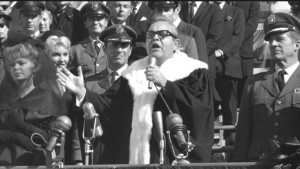 |
Comer flees from a desperate Morse via a a car chase through the night-time LA streets, lovingly shot in lurching Seasick-o-vision wide angle, and tracks Stander down to a seedy bar where, in a well-played drunk turn, he laughs in her stupid virginal face and falls off his barstool. With the mocking laughter ringing through her head, she runs through the town and things fragment. We get Steiger weightlifting in his Y-fronts. Reverend Winters indulging in some ace theatrical villain laughter. An odd animated interlude of statues shagging. Mrs Joyboy collapsing under the contents of her fridge. The odd choice epithet – ‘China may brainwash, Russia may educate, but America breeds its genius!’ This is truly unlike any other film, in good ways as much as in bad.
We won’t spoil the ending, indeed we’re not sure we could even adequately describe the bugger. Suffice to say, true love doesn’t exactly win out, and the cargo for the inaugural space funeral isn’t who everyone thinks it is. But this sort of film’s more about the journey than the destination, and what a journey it is. The script is roughly one part Waugh to three part Terry Southern, that architect of big, sprawling counterculture satires who misses as often as he hits, but here he treads that high wire relatively nimbly, putting this entry firmly in the Strangelove enclosure rather than mooching about with the busted flushes like Candy and The Magic Christian. (Casino Royale, needless to say, resides in a special sealed unit all by itself.) It’s hard to pull off this sort of enterprise with anything approaching aplomb, but Southern, great one minute, infuriatingly smug and wayward the next, is as good a practitioner of this messy art form as there’s ever likely to be, and here he wins the battle against self-indulgence… just.
Tony Richardson directs with a strange mix of high-rent Hollywood and kitchen sink shoestringing that takes a bit of getting used to – as does practically everything else about this film, to be fair – but works in a kind of ramshackle way. As we’ve mentioned a dozen times already, the lighting is pin-sharp and luxurious throughout, even when the odd awkward UnSteadicam shot or ramshackle set shows up the fraying ends of the purse strings. This film is often seen as the turkey which broke Richardson’s run of critical and commercial success which spanned five years from Look Back in Anger to Tom Jones, which is mightily unfair McWhirterite statistical reductionism to say the least. Nothing Richardson would do from hereon in would be bracketed up with his early classics, but to lump The Loved One in with half-arsed retreads like The Charge of the Light Brigade and Joseph Andrews is doing this uniquely stupid bit of clever filmmaking a huge disservice.




















Matt Patton
August 3, 2010 at 3:32 am
Tony Richardson and Terry Southern rushing in where Luis Bunuel and Elaine May feared to tread. What frightened the latter pair I will never understand.
The book was actually out-of-date by the time it was published about 1948. It was inspired by a 1945 visit that Waugh made to the Left Coast to try and clear up censorship problems with a proposed film of BRIDESHEAD REIVISTED (they weren’t cleared up and the film didn’t get made–Thank God). At any rate, the all-dominating studios, the Hollywood “British Colony,” and several other things, were falling apart by the time the book got published–the FTC forced the movie studios to sell their theater chains and the changes that wrought in the film industry (not to mention deaths, the end of WWII, and the rise of at least a second generation of American film actors that could Talk Good) was sending the English-Speaking Society scattering. Only Forest Lawn remained, and that was always sort of beyond parody anyway.
Which the 1965 film proved–the first draft of the script, by Christopher Isherwood, was mostly faithful to the book, which made it out of date in a Hollywood now dominated by aging, weakened studios, directors trying to copy all of the stuff they’d seen in those French and Italian movies they saw when they went out for a Chinese dinner on Sunday nights, and actors who also fancied themselves producers and increasingly wanted, God help them, To Direct. So Southern’s draft recycled every gag he could remember from CANDY, THE MAGIC CHRISTIAN, and the stuff he wrote for DR. STRANGELOVE (which was already a recycle of stuff from CANDY and THE MAGIC CHRISTIAN). And it wound up throwing out Waugh’s best stuff, mostly in the corners of the book, about the bleakness of life in LA housing developments, the commercial debasement of serious religious faith, and the yearning for a larger life in a material world.
Robin
March 25, 2014 at 3:43 pm
The line when Comer asks Morse about his uncle’s face that you heard as; “Did his face match his figure?’ ‘Hideously.’” is actually, “Was his face much disfigured? ‘Hideously’.”
She is referring to the fact that a suicide by hanging contorts the face.
George White
November 18, 2018 at 5:14 pm
Watched it today. I want to like it, but it feels such a trifle that it collapses beneath itself. Robert Morse is miscast. The sheer strangeness almost carries it, before it goes up its arse.
Though one of the extras in the canteen is wearing the mask David McCallum wore in the Sixth Finger ep of the Outer Limits.
George White
September 18, 2020 at 1:43 pm
Robert Easton was also the voice of Phones in Stingray.